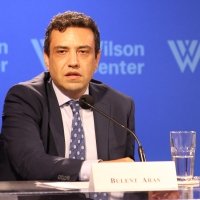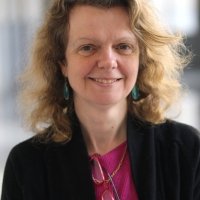Turkey in 2016: Domestic Politics, EU Relations and Beyond
Four experts offered their analysis on the future of domestic politics in Turkey and assessed the country’s evolving relationships with the West.
On January 21, 2016, the Global Europe Program and the Middle East Program at the Woodrow Wilson Center hosted the event “Turkey in 2016: Domestic Politics, EU Relations and Beyond,” with Bulent Aras, Senior Fellow at the Istanbul Policy Center, Sabanci University and Global Fellow at the Woodrow Wilson Center; Michelle Egan, Fellow at the Woodrow Wilson Center and Professor and Jean Monnet Chair ad personam at American University’s School of International Service; Fuat Keyman, Director of the Istanbul Policy Center and Professor of International Relations at Sabanci University; and Amberin Zaman, Columnist, Al Monitor and Public Policy Fellow at the Woodrow Wilson Center. Henri J. Barkey, Director of the Middle East Program at the Woodrow Wilson Center, moderated the event.
Aras began by discussing the historical codependency of Turkey and the West, noting that a Western-oriented restructuring process has occurred in Turkey since the Treaty of Westphalia. He also said that in periods of regional and global crisis, including the aftermath of September 11, 2001 and the Arab uprisings of 2011, the Turkish response has been in line with the West’s response. He pointed to a visible rapprochement between Turkey and the West in the years following the Arab Spring, and mentioned refugee issues as a possible area of collaboration.
Egan focused her analysis on relations between Turkey and the EU. She explained that the EU enlargement process has become more institutionalized and intrusive in recent years, making it less accepting of Turkey’s pace of reform. She also described profound disintegration trends in Europe as a response to the Eurozone crisis, the rise of right-wing populism, and the retreat of the left in European societies. She asserted that some argue that Turkey cannot be expected to make significant domestic, structural, economic, political, and legal reforms without a credible EU membership option. Egan concluded by explaining that the Turkey-EU partnership is rooted in strategic interests, which will continue to evolve in response to issues such as the refugee crisis.
Keyman stressed that Turkish prosperity can only continue if Turkey stays stable internally. He believes this is dependent on how Turkey and PKK relations will unfold and what role Turkey should play in the Middle East and against ISIL. If the world desires a stable and normalized Middle East, Keyman said, Turkey must engage as a soft power (supporting civil society and playing roles in humanitarian affairs and negotiations) instead of just acting as a buffer for conflict.
Zaman focused her analysis on Turkey’s internal conflicts, explaining that it is impossible to separate Turkish foreign policy from its domestic issues. She described Turkey’s crushing of dissent, restrictions on media freedom, corrupt judiciary, nationalist rhetoric, and war in the country’s southeast area as threats to Turkish stability and prosperity. Zaman emphasized that the U.S. policy of treating the PKK and the YPG as separate allows the United States to turn a blind eye to the abuses. This, she warned, is not a sustainable policy, as it destabilizes U.S. relations with Iraqi Kurds (with whom the United States is allied) and erodes U.S. legitimacy in the region.
Barkey then asked the speakers to make closing statements to summarize their positions on the issues discussed. Egan proposed a discussion on Turkish agency, noting that Turkey is always a receiver and rarely an actor in international conflict. Aras and Keyman responded to Egan by pointing out that in its rapprochement with Europe, Turkey is exhibiting agency. Keyman explained his concern that Turkey is focusing more on security than soft power, and expressed his desire for Turkey to become a contributor (not just a buffer) in the current conflict resolution efforts in the Middle East.
By Veronica Baker, Middle East Program
Speakers

Professor of International Relations, Faculty of Arts and Social Sciences at Sabancı University, Istanbul, Turkey

Professor and Jean Monnet Chair ad personam, School of International Service, American University
Columnist for the independent Turkish online news portal Diken as well as for Al Monitor, a Washington DC based online news outlet covering the Middle East; Turkey Correspondent, The Economist (1999-2015)

Senior Fellow, Council on Foreign Relations
Hosted By

Global Europe Program
The Global Europe Program is focused on Europe’s capabilities, and how it engages on critical global issues. We investigate European approaches to critical global issues. We examine Europe’s relations with Russia and Eurasia, China and the Indo-Pacific, the Middle East and Africa. Our initiatives include “Ukraine in Europe”—an examination of what it will take to make Ukraine’s European future a reality. But we also examine the role of NATO, the European Union and the OSCE, Europe’s energy security, transatlantic trade disputes, and challenges to democracy. The Global Europe Program’s staff, scholars-in-residence, and Global Fellows participate in seminars, policy study groups, and international conferences to provide analytical recommendations to policy makers and the media. Read more


Middle East Program
The Wilson Center’s Middle East Program serves as a crucial resource for the policymaking community and beyond, providing analyses and research that helps inform US foreign policymaking, stimulates public debate, and expands knowledge about issues in the wider Middle East and North Africa (MENA) region. Read more
